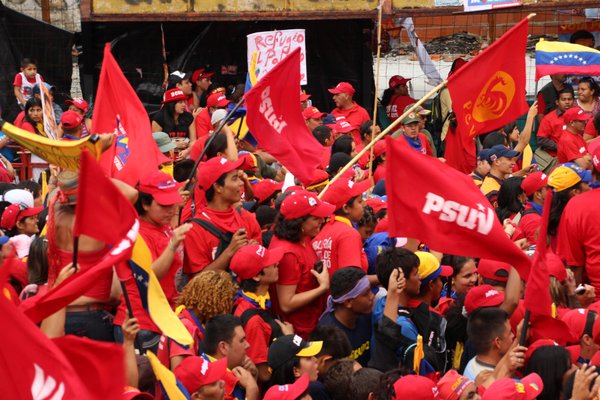rabble is expanding our Parliamentary Bureau and we need your help! Support us on Patreon today!
A national legislative election took place in Venezuela on December 6. The results were a defeat of the governing coalition led by the United Socialist Party of Venezuela (PSUV) and President Nicholas Maduro. Below is a selection of news reports and background analysis of the electoral defeat. The lead item is an interview on The Real News Network with Greg Wilpert and Alejandro Velasco.
With 22 seats still to be counted for the 167-seat legislature, the right-wing opposition parties have won 99 seats and the PSUV-led coalition have 46. Voter turnout was 75 per cent. The vote split was approximately 60-40.
With a minimum of 100 seats, the legislative opposition will have the power to remove ministers from the presidential cabinet and heavily influence government spending. If it wins more than 111 seats, the opposition would have the legislative power to dismiss judges of the Supreme Court, reform the country’s constitution and convoke a recall referendum of the national executive without having collected the minimum quota of signatures required by the Bolivarian Constitution of Venezuela.
That said, the opposition coalition is composed of 27 parties with divergent views on many issues.
President Nicholas Maduro was chosen by the PSUV to succeed President Hugo Chavez, who died tragically on March 5, 2013 following a long bout with cancer. Maduro narrowly won the presidential election of April 14, 2013. His mandate expires in 2019.
Opposition landslide in Venezuela – Maduro accepts results, interview (23 minutes) on The Real News Network with Greg Wilpert and Alejandro Velasco, Dec 7, 2015
Greg Wilpert is the former director of Telesur English and author of ‘Changing Venezuela by Taking Power; The History and Policies of the Chavez Government. Alejandro Velasco is an associate professor of Latin American studies and history at New York University and author of ‘Barrio Rising: Urban Popular Politics and the Making of Modern Venezuela’.
The following articles are published or re-posted on Venezuela Analysis, a vital source of news and analysis of Venezuela:
* News report: Venezuelan opposition sweeps parliamentary elections, by Rachael Boothroyd Rojas, Venezuela Analysis, Dec 7, 2015
* Setting the record straight on Venezuela, by Steve Ellner, published in Jacobin, Dec 6, 2015
In many ways, Hugo Chávez’s legacy is at stake on December 6. An opposition victory in Venezuela’s National Assembly elections would undoubtedly fuel an anti-Chávez narrative that is both simplistic and deceptive, jeopardizing the deceased president’s well-earned fame as a champion of the underprivileged…
* The roots of the current situation in Venezuela, by Gregory Wilpert, published on TeleSur English, Nov 23, 2015
The current economic, political, and social situation in Venezuela is very complicated, which makes it somewhat difficult for outsiders to make sense of. On the one hand there are many people who defend the Bolivarian revolution, pointing to the successes it has had in reducing poverty and inequality and in increasing citizen participation and self-governance. On the other hand, there is a chorus of critics, not just from the usual suspects on the political right, but often from the left, who criticize the Maduro government’s economic management of the country, corruption, the high inflation rate and shortages, and the trial of a high profile opposition politician, who the government accuses of fomenting violence. How did Venezuela get here? What happened since Hugo Chavez’s death? Did the project derail, get stuck, hit a speed bump, or crash altogether? In order to answer this question, I will first analyze the origins of the current economic situation. Future articles in this series will explore what this history means for the present and immediate future of Venezuela…
And read also:
Venezuela: terminal crisis of the rentier petro-state?, research paper by Edgardo Lander (Venezuelan researcher), Oct 2, 2014
rabble is expanding our Parliamentary Bureau and we need your help! Support us on Patreon today!



